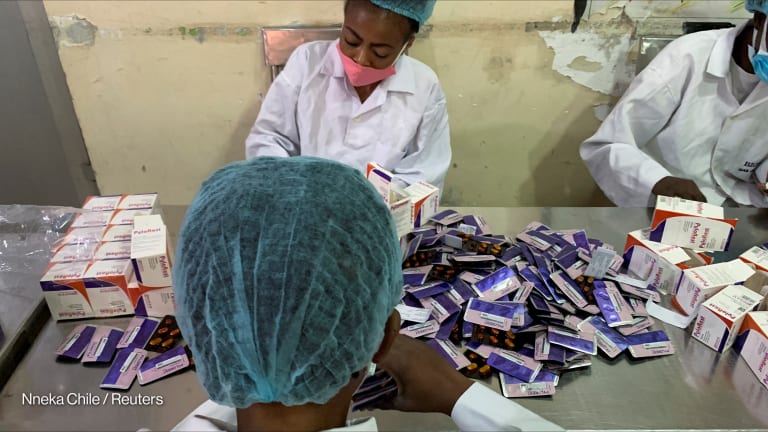
By 2030, Africa’s health market is estimated to be worth hundreds of billions of dollars, making a strong case for building local production capacity in the continent — an agenda that has taken hold as countries realize the deadly consequences of relying on imports for health products like COVID-19 vaccines.
Sign up for Devex CheckUp
The must-read weekly newsletter for exclusive global health news and insider insights.
But Emmanuel Mujuru, chairperson at the Federation of African Pharmaceutical Manufacturers Associations, cautioned that it takes more than political announcements to build Africa’s pharmaceutical production capacity.
It requires political commitment from the highest levels of government; the right regulations and policy coherence across government agencies; long-term financing that should come in the form of development finance with affordable interest rates; and market access to ensure there is sufficient demand for locally produced medicines, vaccines, and other health products, he said in a virtual session of the first World Local Production Forum hosted by the World Health Organization.
Mujuru said sub-Saharan Africa imports most of its medicines, effectively leaving a small market of 30% to local producers. To ensure sustainability and the promotion of local production, he also encouraged donor-funded programs such as the Global Fund to Fight AIDS, Tuberculosis and Malaria to procure more medicine supplies from local and regional industries.
“This is not just about money and infrastructure. It is about regulation, capacity and skills, supply chain management, trade integration, scientific cooperation, and demand-side considerations.”
— Jutta Urpilainen, commissioner for international partnerships, European CommissionStrong regulatory systems are also key to ensure the quality and effectiveness of medicines, investments in human capital, and policy literacy among those working in government, Mujuru said.
Africa imports about $14.5 billion worth of pharmaceutical goods each year, but there’s a strong business and economic case for local production of pharmaceuticals on the continent, said Stephen Karingi, director for regional integration and trade division at the United Nations Economic Commission for Africa, who spoke at the same session.
“At the moment, the Africa pharmaceutical industry is estimated at about $65 billion. And by 2030, the whole of Africa’s health market … it will be about $259 billion,” he said.
The forum, which runs from June 21 to 25, is set to become a regular event where different stakeholders can come together to discuss how to enhance local production and build more secure supply chains for the future. It comes after last month’s 74th World Health Assembly, where over 100 countries supported a resolution calling for strengthening local production of medicines and other health technologies.
New tech hub aims to boost access to mRNA COVID-19 vaccines in Africa
A new hub intends to increase local manufacturing of messenger RNA COVID-19 vaccines on the African continent by providing training on the technology.
The agenda has huge momentum at the moment. During the forum’s opening on Monday, EU Commissioner for International Partnerships Jutta Urpilainen said Team Europe aims to work with the African Union to develop and strengthen pharmaceutical production on the continent.
“We aim to develop a number of regional manufacturing hubs across the continent. This is not just about money and infrastructure. It is about regulation, capacity and skills, supply chain management, trade integration, scientific cooperation, and demand-side considerations,” she said.
Mujuru said COVID-19 has served as a wake-up call for the need to “seriously and expeditiously” address local production challenges in Africa and other regions of the world where countries have struggled to procure COVID-19 vaccines and experienced shortages of life-saving medicines.
But he also noted that “we have received so many wake-up calls.” The challenge, he said, is making sure “we will always stay awake” and stand ready to face future challenges.









